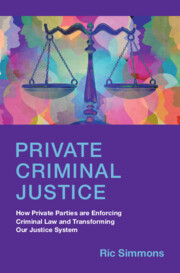 Private Criminal Justice
Private Criminal Justice Published online by Cambridge University Press: 21 September 2023
This chapter discusses how a criminal justice system can operate without state input. Conventional wisdom states that the state is an essential aspect of any criminal justice system, based on three assumptions: first, only the state can delineate exactly what acts constitute a crime; second, the purpose of the criminal law is a collective, society-wide statement of condemnation against certain acts; and third, coercion and violence are often used in a criminal justice system and the state has a monopoly on the leigitmate use of force. The chapter rebuts each of these assumptions. First, the chapter notes that, through a combination of natural law and societal mores, there is a consensus on what actions should be considered criminal, even without a state legislature promulgating specific crimes. Second, private responses to criminal activity can further society's goals of deterrence and retribution, even though they also fulfill the needs of the private actors. Third, many responses to criminal activity do not require coercion or force and, even if they do, the state has authorized private uses of force in certain circumstances.
To save this book to your Kindle, first ensure [email protected] is added to your Approved Personal Document E-mail List under your Personal Document Settings on the Manage Your Content and Devices page of your Amazon account. Then enter the ‘name’ part of your Kindle email address below. Find out more about saving to your Kindle.
Note you can select to save to either the @free.kindle.com or @kindle.com variations. ‘@free.kindle.com’ emails are free but can only be saved to your device when it is connected to wi-fi. ‘@kindle.com’ emails can be delivered even when you are not connected to wi-fi, but note that service fees apply.
Find out more about the Kindle Personal Document Service.
To save content items to your account, please confirm that you agree to abide by our usage policies. If this is the first time you use this feature, you will be asked to authorise Cambridge Core to connect with your account. Find out more about saving content to Dropbox.
To save content items to your account, please confirm that you agree to abide by our usage policies. If this is the first time you use this feature, you will be asked to authorise Cambridge Core to connect with your account. Find out more about saving content to Google Drive.